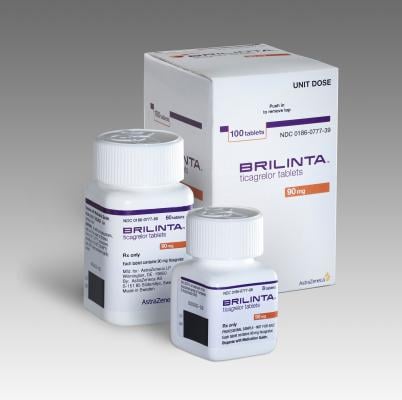
August 20, 2014 — AstraZeneca received confirmation from the United States Department of Justice that it is closing its investigation into PLATO, a clinical trial that tested the safety and effectiveness of the blood thinner ticagrelor (Brilinta). The government is not planning any further action.
In October 2013, the drug company received a civil investigative demand from the U.S. Department of Justice seeking documents and information related to the PLATO trial. AstraZeneca cooperated with the government enquiry, which focused on questions that have been raised previously in public about the trial. Similar questions have been responded to by the independent PLATO Executive Committee, which led the clinical trial.
“We welcome the Department of Justice’s decision not to pursue further action,” said CEO Pascal Soriot. “We have always had absolute confidence in the integrity of the PLATO trial and we are proud of the important benefit Brilinta offers to patients around the world suffering from acute coronary syndrome. As one of AstraZeneca’s growth platforms, we are committed to delivering the full potential of this important medicine.”
In 2011, the U.S. Food and Drug Administration (FDA) approved ticagrelor for the treatment of patients with acute coronary syndrome (ACS). It has been approved by regulatory authorities in over 100 countries and is included in 11 major ACS treatment guidelines globally, including six established U.S. treatment guidelines. The trial manuscript from the PLATO Executive Committee was first published in the New England Journal of Medicine. Following additional rigorous peer-review, more than 30 PLATO sub-analyses articles have subsequently been published. The combination of these global reviews makes the PLATO data set one of the most widely analyzed clinical trials.
PLATO was a large (18,624 patients in 43 countries), head-to-head patient outcomes study of ticagrelor vs. clopidogrel (Plavix), both given in combination with aspirin and other standard therapy. The trial was designed to establish whether ticagrelor plus aspirin could achieve a clinically meaningful reduction in cardiovascular (CV) events in acute coronary syndrome (ACS) patients, above and beyond that afforded by clopidogrel plus aspirin. Patients were treated for at least six months and up to 12 months. Ticagrelor plus aspirin has been proven clinically superior to clopidogrel plus aspirin, in reducing thrombotic CV events, including CV death, at 12 months, based on data from the PLATO trial.
AstraZeneca recently announced the start of the SOCRATES trial, studying ticagrelor for patients with acute ischemic stroke or transient ischemic attack, and the THEMIS study in patients with Type 2 diabetes and coronary atherosclerosis. These studies form part of PARTHENON, AstraZeneca’s largest ever clinical trial program, involving more than 80,000 patients worldwide. The program also includes two trials that have recently completed recruitment; EUCLID for patients with Peripheral Artery Disease and PEGASUS, studying Brilinta for secondary prevention in patients with previous myocardial infarction. Headline results for PEGASUS are expected in the first quarter of 2015.
For more information: www.brilinta.com


 January 05, 2026
January 05, 2026 









